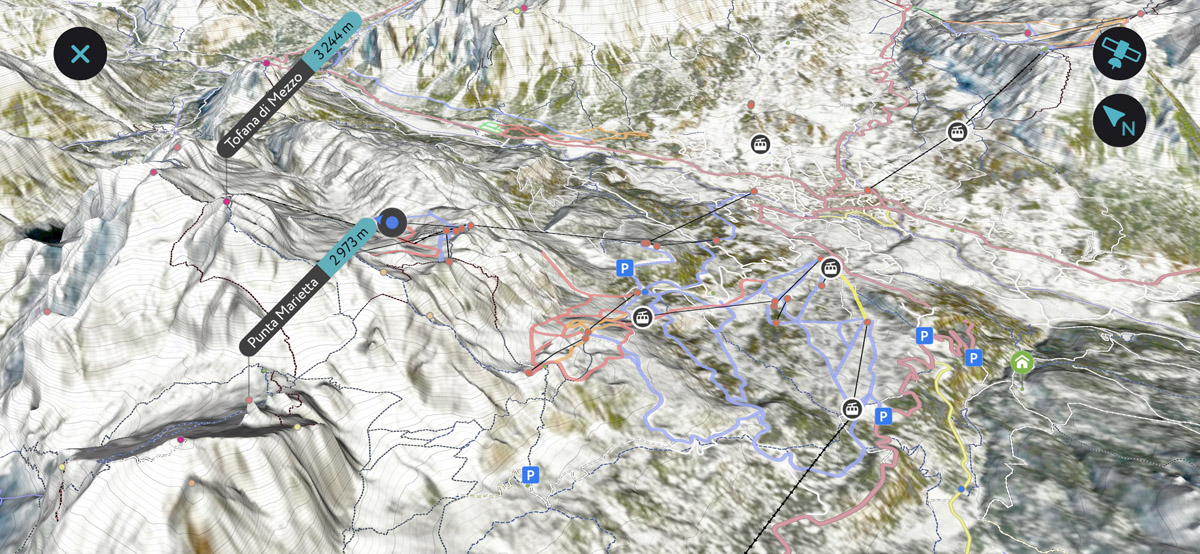Get PeakVisor App
Sign In
Search by GPS coordinates
- Latitude
- ° ' ''
- Longitude
- ° ' ''
- Units of Length

Yes
Cancel
❤ Wishlist ×
Choose
Delete
In 2017, the Government of Alberta officially established Castle Provincial Park and expanded Castle Wildland Provincial Park, forming a 259,460-acre wilderness area along the eastern slopes of the Rocky Mountains in southern Alberta.

The Castle area, which borders Waterton Lakes National Park, the Crowsnest Pass, and the Flathead River Valley in British Columbia, is known as one of the most biologically diverse regions in Alberta.
Together, these two parks provide a habitat for more than 200 rare or at-risk species, including whitebark pine, wolverine, grizzly bear, and bull trout. Castle Wildland, in particular, also contains two major wildlife movement corridors for wide-ranging species.
Though conservation of nature is an objective in both parks, Castle Wildland Park’s ‘Wildland’ designation means that it’s geared more toward conservation than development. In fact, development in the park is limited to low-impact outdoor recreation in a backcountry or remote, wilderness setting. Wildland parks are generally undisturbed areas that aim to protect large, ecologically healthy and functioning landscapes, while still offering visitors the opportunity to venture off the grid.
There are 48 named mountains in Castle Wildland Provincial Park. Mount Ptolemy, the highest and most prominent in the park, sits in the Crowsnest Range. Some of the tallest peaks in the park also include Andy Good Peak, Mount McGladrey, Mount Glendowan, and Mount Coulthard.
Castle Wildland is both rugged and isolated, but several summits are said to have the best views in Alberta, including Mount Haig, Victoria Peak, Loaf Mountain, Drywood Mountain, and Mount Gladstone. Alberta Parks is also in the process of developing a world-class, backcountry hut-to-hut system in the park, in partnership with the Alpine Club of Canada. Once completed, this epic hut system would be the first accessible backcountry hut in Alberta’s provincial parks.

Hiking and snowshoeing are permitted anywhere in the Castle Parks, unless otherwise posted. However, trails are not regularly maintained, particularly in Castle Wildland Provincial Park. Hikers are expected to leave no trace and have experience and appropriate equipment when traveling into the backcountry.
The Bathing Lake Day Use Area and Butcher Lake Day Use area are ideal for fishing, picnicking, and are popular starting points for backcountry adventures. The West Castle Trail, at Castle Mount Resort, is another popular trail that leads into the West Castle Valley.
Opened in 1966, Castle Mountain is a ski resort tucked in the West castle Valley in the Rocky Mountains. Renowned for its long, steep runs and 350+ inches of fresh powder, Castle Mountain encompasses over 3,500 skiable acres, including 78 maintained ski trails and 8 alpine bowls. Castle Mountain is also home to one of North America’s only resort-based cat skiing operations, the Powder Stagecoach. A variety of hotels, chalets, and cabins can be found on and off the mountain.

Known as the gateway to Waterton Lakes National Park, Pincher Creek is a small mountain community situated in the heart of the Rocky Mountains. Pincher Creek offers everything from skiing to rock climbing, kayaking to hiking all year long. In the winter, Pincher Creek is also the perfect destination for cross-country skiing, snowmobiling, ice fishing, and skating.
Explore Castle Wildland Provincial Park with the PeakVisor 3D Map and identify its summits.



